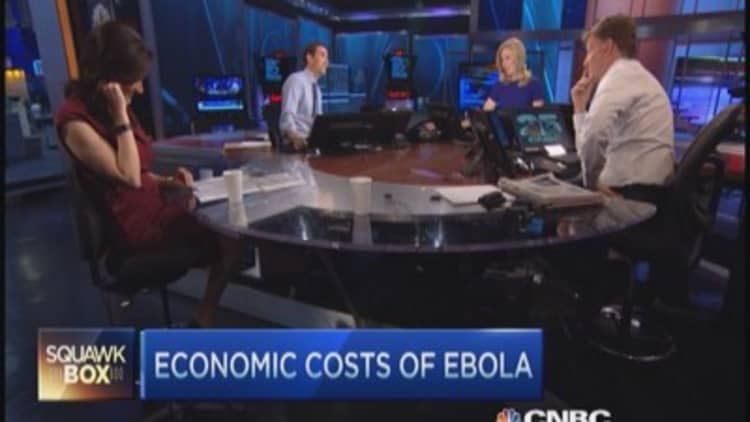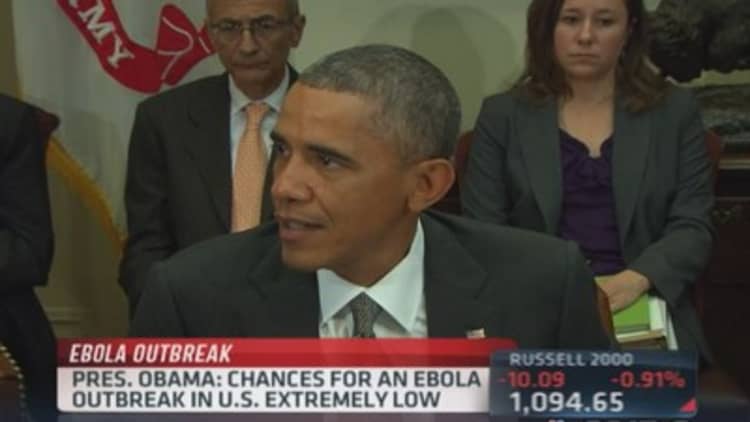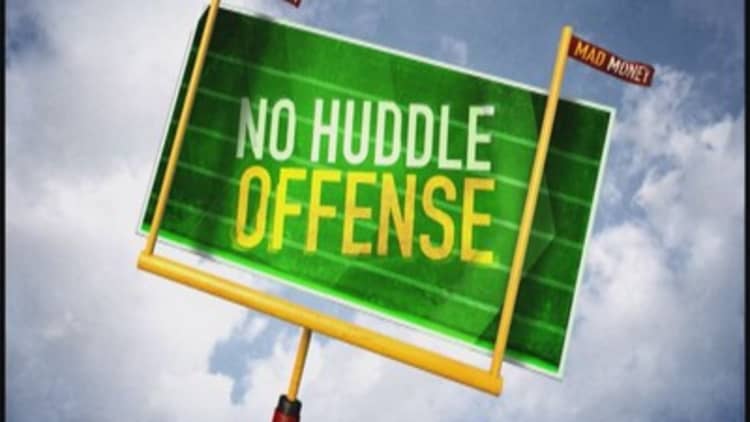
The topic everyone on Wall Street is discussing urgently but quietly isn't the volatile stock market.
It is Ebola.
Read MoreCDC must 'rethink' its approach to Ebola: Official
While thousands of health care workers seek to control the deadly virus in West Africa, and the Centers for Disease Control and Prevention and other medical professionals seek to prevent its outbreak in the United States, financial analysts and others have been trying to estimate — or "model," in Wall Street parlance — the potential effect on the global economy.
The math is not pretty.
The most authoritative model, at the moment, suggests a potential economic drain of as much as $32.6 billion by the end of 2015 if "the epidemic spreads into neighboring countries" beyond Liberia, Guinea and Sierra Leone, according to a recent study by the World Bank.
More from The New York Times:
Putting the Berkshire Brand Before Warren Buffett
Longtime Chief Leaves C.I.C.C., a Major Chinese Investment Bank
Bankers Get a Painful Reminder About Conflicts ofInterest
That estimate is considered a worst-case scenario, but it does not account for any costs beyond the next 18 months, nor does it assume a global pandemic.
Over the weekend, the topic of Ebola was front and center at the annual meeting of the International Monetary Fund and World Bank in Washington, where central bankers, world leaders and some of Wall Street's senior executives held a series of meetings and dinners.
Christine Lagarde, the managing director of the I.M.F., was seen wearing a button that read: "Isolate Ebola, Not Countries." She implored the audience: "We should be very careful not to terrify the planet in respect of the whole of Africa."
Read MoreCocoa companies team up to fight against Ebola
That's because the economic cost of fear, far more than medical costs, may be the most expensive outcome.

"Economic consequences also result when fear and concern change behavior," David R. Kotok, the chairman and chief investment officer of Cumberland Advisors, wrote in a report late last week, addressing the potential fallout on gross domestic products. "If consumers and businesses retrench by reducing flights on airplanes, changing vacation plans or altering business connections in a globally interdependent world, G.D.P. growth rates will fall farther. We do not know how much, at what speed, or for how long."
Shares of airline stocks like United and American fell on Monday as some investors began to worry about the prospect of travel bans for airlines from West Africa to Europe and the United States.
Andrew Zarnett, an analyst at Deutsche Bank, wrote a recent report that examined the potential effects of Ebola and compared it to the economic toll of the SARS epidemic, which cost Asian airlines about $6 billion in 2003.
"History has shown us that should the Ebola epidemic spread domestically, it will have a significant impact on the airline and the entire hospitality sector," he wrote, according to FXStreet, a financial news service.
And nobody has yet fully calculated the numbers on the cost to the health care system: training, testing, treatment, waste disposal — and all the hospital beds that are sitting unused in isolation areas. (Perversely enough, many of the health care costs could conceivably help that industry in the short term because additional money is being spent.)
Read MoreEbola: Acloser look at this 'frightening disease'
Of course, the greatest economic danger is in the economic isolation of countries. "By default or design, it really is an economic embargo," Kaifala Marah, finance minister of Sierra Leone, said over the weekend about his country, which has been all but cut off from the outside world.
The newest estimates about the economic cost of Ebola, conducted by John Panzer and Francisco Ferreira of the World Bank, may be the deepest look at the problem by any analyst or economist. The report notes that in the very short term, assuming that the spread of Ebola is contained, the economic costs should be low, about $359 million.

The study gets more worrying as the authors examine the economic prospects 18 months out.
The authors developed the "Ebola Impact Index." As one of their advisers, Marcelo Giugale, senior director of the World Bank's global practice for macroeconomics and fiscal management, wrote of the index: "It roughly tells you how likely countries in Africa, Europe and the U.S. are to be affected by Ebola. They then used some pretty sophisticated statistical tools to model the economic links between West Africa and the rest of the world. And finally, they built two 'scenarios' for how governments and people might behave."
Read MoreBudget cuts are NOTwhy there's no Ebola vaccine
One scenario contemplates containment of the virus with no more than 20,000 cases. That's the good version. The bad version is this: Governments make a series of mistakes that lead to 200,000 cases of Ebola.
It is that scenario that they estimate would cost $32.6 billion. (This may sound cynical, but that is still lower than one-quarter of Apple's annual revenue.)
"What makes all this very interesting is that the final economic toll of Ebola will not be driven by the direct costs of the disease itself — expensive drugs, sick employees and busy caregivers. It will be driven by how much those who are not infected trust their governments," Mr. Giugale wrote.
Wall Street has long built spreadsheets trying to estimate employment, economic growth figures and the values of businesses. But the economic variables of a true pandemic are almost incalculable. It becomes a series of guesstimates about the psychology of global citizens.
Right now, the economic challenges of the outbreak of Ebola are minimal. Let's hope they remain that way.


